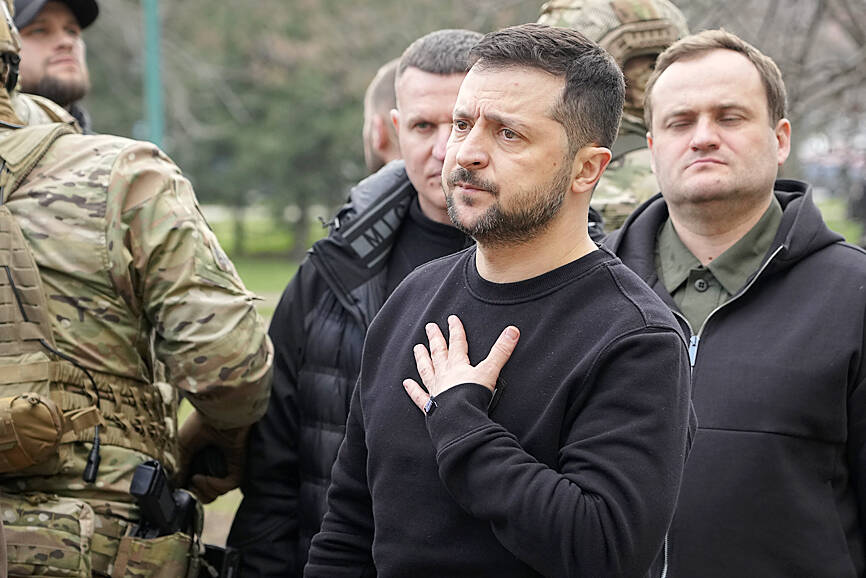Ukrainian President Volodymyr Zelenskiy has invited Chinese President Xi Jinping (習近平) to visit his nation, saying they have not been in contact since the war began and he is “ready to see him here.”
“I want to speak with him,” Zelenskiy told reporters on Tuesday, a week after Xi visited Russian President Vladimir Putin.
China has been economically aligned and politically favorable toward neighboring Russia across many decades, and Beijing has provided Putin diplomatic cover by staking out an official position of neutrality in the war.

Photo: AP
Xi is an important player in the Russia-Ukraine conflict, and even China’s lack of involvement is a potent statement.
Zelenskiy spoke aboard a train that was shuttling him across Ukraine, to cities near some of the fiercest fighting and others where his country’s forces have successfully repelled Russia’s invasion.
Zelenskiy rarely travels with journalists, and the president’s office said the two-night train trip with reporters was the most extensive since the war began.
Zelenskiy has extended invitations to Xi before in recent months, but this explicit call to visit comes days after the Chinese leader visited Putin in Russia last week.
However, the Ukrainian leader said he has not communicated with Xi for the duration of the conflict.
“We are ready to see him here,” Zelenskiy said. “I had contact with him before full-scale war, but during all this year, more than one year, I didn’t have.”
In Beijing, Chinese Ministry of Foreign Affairs spokesperson Mao Ning (毛寧) was asked whether Xi would accept an invitation from Zelenskiy — or whether one had been officially extended.
She told reporters she had no information to provide, aside from saying that Beijing maintains “communication with all parties concerned, including Ukraine.”
Kremlin spokesman Dmitry Peskov was asked whether a meeting between Xi and Zelenskiy would be useful to resolve the conflict in Ukraine.
Peskov said Russian authorities “highly appreciate” China’s balanced position on the issue and “have no right to come up with any advice” on whether the two should meet.
“The Chinese leader himself decides the appropriateness of certain contacts,” Peskov said on Wednesday during his daily conference call with reporters.
In Washington, US National Security Council spokesman John Kirby said the US supports talks between Xi and Zelenskiy, “and my goodness, we’ve been saying that for weeks.”
Xi’s Russia visit last week raised the prospect that Beijing might be ready to provide Moscow with the weapons and ammunition it needs to refill its depleted stockpile.
However, Xi’s trip ended without any such announcement.
Days later, Putin said he would deploy tactical nuclear weapons to Belarus, which neighbors Russia and pushes the Kremlin’s nuclear stockpile closer to NATO territory.
Zelenskiy suggested that Putin’s move was intended to distract from the lack of guarantees he received from China.
“What does it mean? It means that the visit was not good for Russia,” Zelenskiy said.

MORE VISITORS: The Tourism Administration said that it is seeing positive prospects in its efforts to expand the tourism market in North America and Europe Taiwan has been ranked as the cheapest place in the world to travel to this year, based on a list recommended by NerdWallet. The San Francisco-based personal finance company said that Taiwan topped the list of 16 nations it chose for budget travelers because US tourists do not need visas and travelers can easily have a good meal for less than US$10. A bus ride in Taipei costs just under US$0.50, while subway rides start at US$0.60, the firm said, adding that public transportation in Taiwan is easy to navigate. The firm also called Taiwan a “food lover’s paradise,” citing inexpensive breakfast stalls

TRADE: A mandatory declaration of origin for manufactured goods bound for the US is to take effect on May 7 to block China from exploiting Taiwan’s trade channels All products manufactured in Taiwan and exported to the US must include a signed declaration of origin starting on May 7, the Bureau of Foreign Trade announced yesterday. US President Donald Trump on April 2 imposed a 32 percent tariff on imports from Taiwan, but one week later announced a 90-day pause on its implementation. However, a universal 10 percent tariff was immediately applied to most imports from around the world. On April 12, the Trump administration further exempted computers, smartphones and semiconductors from the new tariffs. In response, President William Lai’s (賴清德) administration has introduced a series of countermeasures to support affected

CROSS-STRAIT: The vast majority of Taiwanese support maintaining the ‘status quo,’ while concern is rising about Beijing’s influence operations More than eight out of 10 Taiwanese reject Beijing’s “one country, two systems” framework for cross-strait relations, according to a survey released by the Mainland Affairs Council (MAC) on Thursday. The MAC’s latest quarterly survey found that 84.4 percent of respondents opposed Beijing’s “one country, two systems” formula for handling cross-strait relations — a figure consistent with past polling. Over the past three years, opposition to the framework has remained high, ranging from a low of 83.6 percent in April 2023 to a peak of 89.6 percent in April last year. In the most recent poll, 82.5 percent also rejected China’s

PLUGGING HOLES: The amendments would bring the legislation in line with systems found in other countries such as Japan and the US, Legislator Chen Kuan-ting said Democratic Progressive Party (DPP) Legislator Chen Kuan-ting (陳冠廷) has proposed amending national security legislation amid a spate of espionage cases. Potential gaps in security vetting procedures for personnel with access to sensitive information prompted him to propose the amendments, which would introduce changes to Article 14 of the Classified National Security Information Protection Act (國家機密保護法), Chen said yesterday. The proposal, which aims to enhance interagency vetting procedures and reduce the risk of classified information leaks, would establish a comprehensive security clearance system in Taiwan, he said. The amendment would require character and loyalty checks for civil servants and intelligence personnel prior to